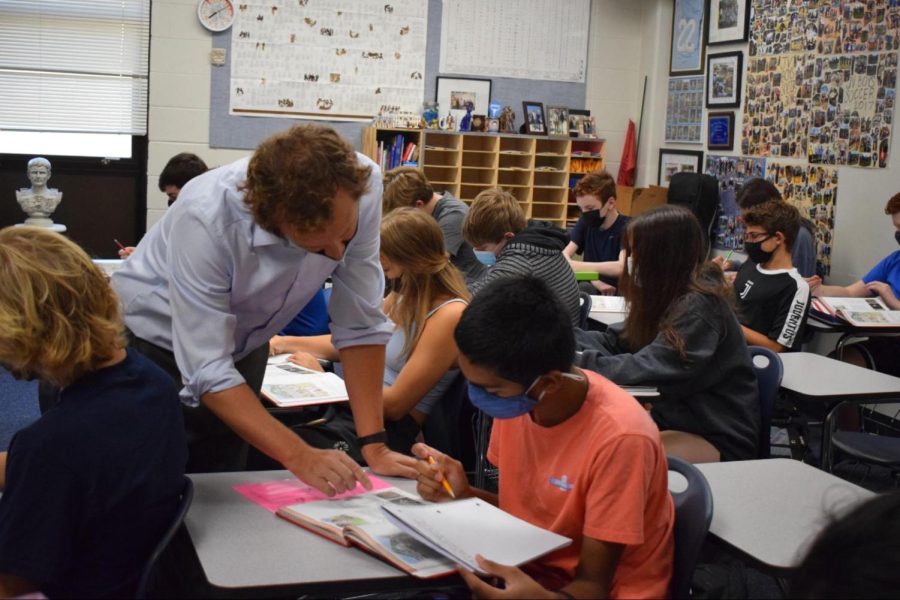Attempting to bring the curriculum to life, Latin teacher Tom Herpel offers a 10-day trip to his students to travel to Italy over spring break. During the trip, students immerse themselves in the archeology and the history of Italy, whether walking through the uncovered remains of the Circus Maximus or learning hands-on Italian cuisine in a new cooking class.
To take part, participants wrote a statement about why they wanted to go on the trip, acquired three teacher recommendations, and procured between $4,000 – $4,500. Participation is prioritized by if students will get another chance to attend based on their Latin level and years left of high school.
“If they’re a person that is constantly not following the rules, well, I’m not bringing you to Europe. The rest of the world has negative views of Americans; I don’t need certain people [reinforcing that],” Herpel said.
To date, 29 Latin students have signed up for the Italy trip across the district, and one worry Herpel faces when traveling abroad with students is their behavior. As a result, the school sets specific parameters for the trip to ensure that the students are respectful.
“At first, it’s a little nerve-wracking because you don’t know whether they’re going to be respectful or not, because usually you’re traveling in groups of four. That’s what I worry about the most, but halfway through the trip, it’s like okay, everyone knows what to do. So they’re usually okay,” Herpel said.
Once the group arrives in Rome, Herpel likes to begin his day with a morning run and welcome students. He enjoys seeing popular places like the Pantheon when there are no crowds.
“We go running through the different towns and the city of Rome when no one is out. We run on the Circus Maximus [and] we see the Pantheon. There are different parts of the city that we get to see that no one else does from the group unless you go running, so it’s neat to be able to do that. You get to see the city in a different light when it’s completely quiet,” Herpel said.
Herpel believes this trip is unlike any other experience the school promotes because it is tailored to the Latin curriculum. He also says it is preferable to go after Latin III because they spend most of the year talking about Rome.
“It’s people that have an interest in this specific culture, that have studied it, that have a really strong appreciation for it. So, for instance, when we get to Italy, we go to our first archaeological site. [And] we go into the ancient town, everyone starts taking pictures of… rocks. And we know – the chaperones, we’re all Latin teachers – We’re all like, ‘this isn’t even the cool stuff yet!’ But that excitement, you don’t get that kind of excitement for that kind of thing. So this year we’re adding a cooking class, we’ve never done that before. [Also, archaeologists have] uncovered part of the archaeological remains of the Circus Maximus, and they have these goggles we’re going to put on to recreate what it would have been like to walk on the track,” Herpel said.
Another purpose of the trip is to supplement the students’ study of the culture. Herpel believes that the content being taught in books alone is bolstered by the experience of seeing what they are learning about in person.
“You know, all these things, [students] see pictures of [them] in their textbooks, but we get to go there in person, you get to interact with all these places. Plus, there’s a lot of, you know, Latin inscriptions and things like that, that we decipher. So it’s really about just experiencing another culture and seeing where the Romans used to live,” Herpel said.
The Latin group also has a dedicated tour director hired for the past three trips. The group follows and manages the situation in those locations wherever the tour guide goes. Since he is Italian, he also handles speaking for the group in those locations.
“He was assigned to us one year, and every year after that, we always put in for him. So he is pretty well known in all the places we go. I mean, even places that don’t know him, he’s a very personal guy, and actually, the guy we’ve had for the past three trips. He’s a really good dude,” Herpel said.
Even though the trip is relatively unchanged from year to year, Herpel still finds value in each experience.
“[The trip is important to me] because it’s just another way to build relationships with my students. It’s also a way to bring the curriculum alive. It’s not just looking at a book or looking at a picture; you get to be there in it. I think that’s priceless,” Herpel said.




![Smiling in a sea of Longhorns, Fox 2 reporter Ty Hawkins joins junior Darren Young during the morning Oct. 3 pep rally. The last time West was featured in this segment was 2011. “[I hope people see this and think] if you come to [Parkway] West, you will have the time of your life because there are so many fun activities to do that make it feel like you belong here. I was surprised so many people attended, but it was a lot of fun,” Young said.](https://pwestpathfinder.com/wp-content/uploads/2025/10/Edited2-1200x798.jpg)
![West High seniors and families listen as a representative of The Scholarship Foundation of St. Louis, Teresa Steinkamp, leads a Free Application for Federal Student Aid (FAFSA) workshop. This session, held in the library, provided guidance on financial aid, scholarships and student loan options. “This event is very beneficial for any seniors who are applying to or considering applying to colleges after high school [because] the cost of college is on the rise for seniors and parents,” college and career counselor Chris Lorenz said.](https://pwestpathfinder.com/wp-content/uploads/2025/09/DSC_4478-1200x778.jpg)
![Senior Kamori Berry walks across the field during halftime at the Homecoming football game on Sept. 12. During the pep assembly earlier that day, she was pronounced Homecoming Queen. “I thought it was nice that the crowd [started] cheering right away. I know [my friends] were really excited for me, and my family was happy because typically non-white people don't win,” Berry said.](https://pwestpathfinder.com/wp-content/uploads/2025/09/DSC7046-Enhanced-NR-1200x798.jpg)



![Pitching the ball on Apr. 14, senior Henry Wild and his team play against Belleville East. Wild was named scholar athlete of the year by St. Louis Post-Dispatch after maintaining a high cumulative GPA and staying involved with athletics for all of high school. “It’s an amazing honor. I feel very blessed to have the opportunity to represent my school [and] what [it] stands for,” Wild said.](https://pwestpathfinder.com/wp-content/uploads/2025/05/unnamed-6-1200x714.jpg)
![The Glory of Missouri award recipients stand with their certificates after finding out which virtue they were chosen to represent. When discovering their virtues, some recipients were met with contented confirmation, while others, complete surprise. “I was not at all surprised to get Truth. I discussed that with some of the other people who were getting the awards as well, and that came up as something I might get. Being in journalism, [Fellowship of Christian Athletes and] Speech and Debate, there's a culture of really caring about truth as a principle that I've tried to contribute to as well. I was very glad; [Truth] was a great one to get,” senior Will Gonsior said.](https://pwestpathfinder.com/wp-content/uploads/2025/04/Group-Glory-of-Missouri.jpg)

